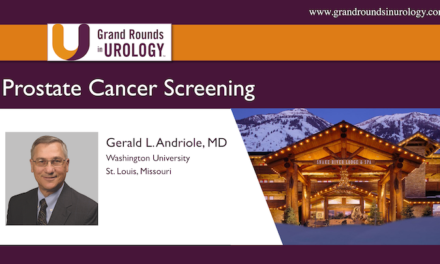How to cite: Baum, Neil H. MD, and Crawford, E. David, MD. “Interviews with Legends – Urology Education and the Future of PCa Screening, Detection, and Management” February 2023. Accessed Jul 2024. https://grandroundsinurology.com/interviews-with-legends-urology-education-and-the-future-of-pca-screening-detection-and-management/
Interviews with Legends – Urology Education and the Future of PCa Screening, Detection, and Management
In his latest Interviews with Legends feature, Grand Rounds in Urology (GRU) Contributing Editor Neil H. Baum, MD, sits down with Editor-in-Chief E. David Crawford, MD, to discuss the educational mission of GRU, Dr. Crawford’s contribution to prostate cancer screening, detection, and treatment, as well as what the future holds for early detection and treatment. The two discuss the origins of GRU as a print publication, and how it has evolved into a video-driven educational site featuring original presentations on a range of urology topics, as well as presentations from cutting-edge CME conferences in urology and uro-oncology. Next, Dr. Baum asks Dr. Crawford about how he developed his PSA screening cutoff of 1.5 ng/ml, and how it has enabled physicians to detect a broader range of cancers before they can metastasize. Dr. Crawford asserts that there should be no hard life expectancy cutoff for giving men options to deal with their prostate cancer–Even with life expectancy of 5-6 years, localized treatment can improve quality of life and prevent other urologic disorders associated with prostate cancer, including urinary problems and enlarged prostate. Last, the two discuss what’s next in the field of prostate cancer treatment. Dr. Crawford believes that prostate cancer will have an entirely different treatment algorithm in 5 years, as physicians integrate advances in PET scanning to further localize disease, and the requirements for biopsy change.

E. David Crawford, MD
University of California San Diego
La Jolla, California
ABOUT THE AUTHOR
Neil H. Baum, MD, is a Clinical Professor of Urology at Tulane Medical School in New Orleans, Louisiana. He is also a retired urologic surgeon. Additionally, Dr. Baum serves as the Medical Advisor to Vanguard Communications Group. Dr. Baum is the author of Marketing Your Clinical Practice - Ethically, Effectively, and Economically, which is in its 4th edition, has sold over 175,000 copies, and has been translated into Spanish. He also wrote The Complete Business Guide to a Successful Medical Practice, which was published in 2015. Dr. Baum was the columnist for American Medical News for more than 25 years. Dr. Baum also wrote the popular column, “The Bottom Line,” for Urology Times for more than 20 years. He is a requested speaker each year to the Practice Management Seminar for the American Urological Association (AUA), where he discusses techniques for making urology practices more efficient and more productive. He has written more than 9 books on practice management and over 250 peer-reviewed articles on various urologic topics. Dr. Baum is also the medical advisor to Vanguard Communications Group.




